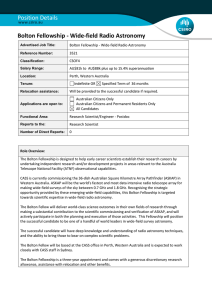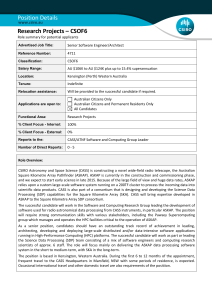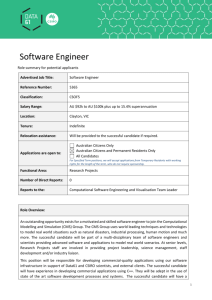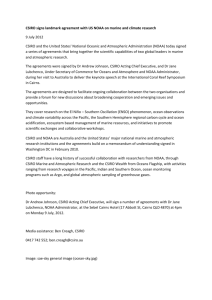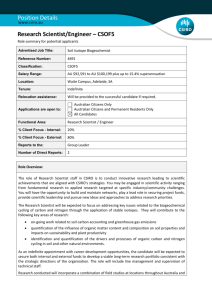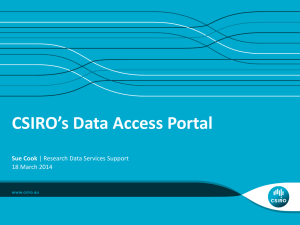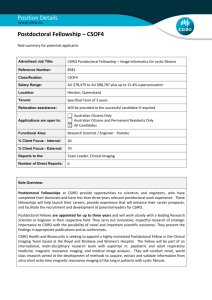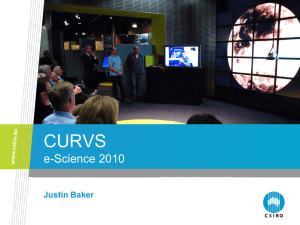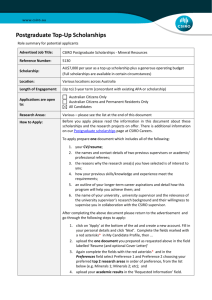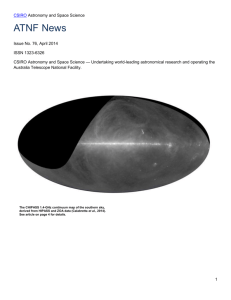Position Details - Research Scientist/Engineer - CSOF6
advertisement
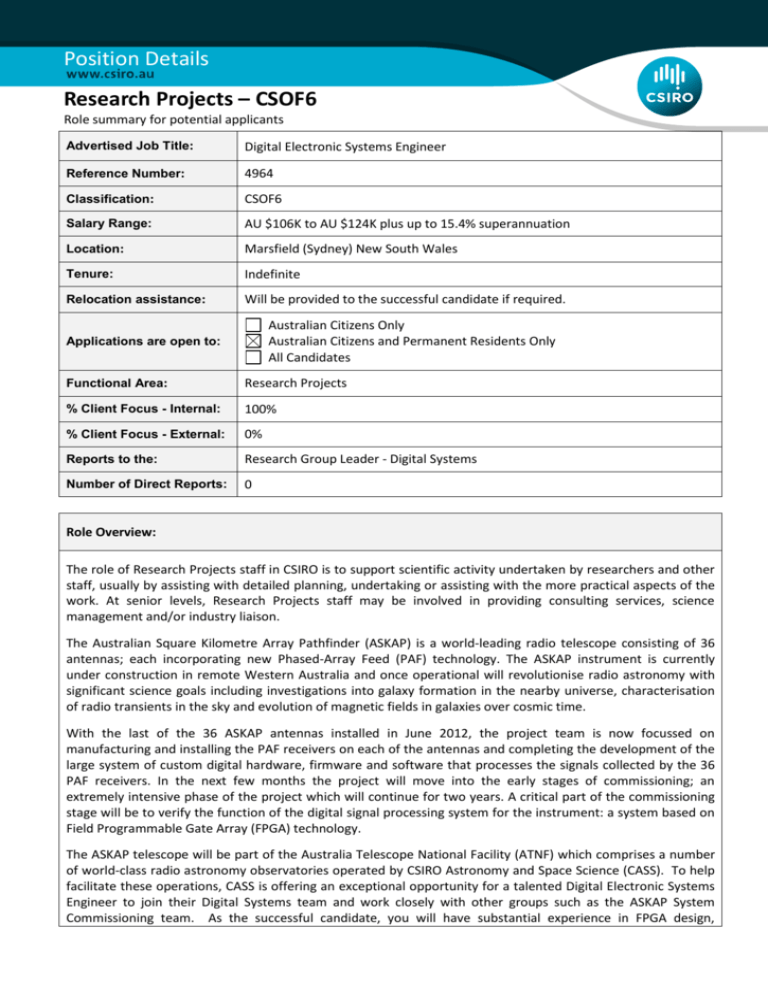
Position Details Research Projects – CSOF6 Role summary for potential applicants Advertised Job Title: Digital Electronic Systems Engineer Reference Number: 4964 Classification: CSOF6 Salary Range: AU $106K to AU $124K plus up to 15.4% superannuation Location: Marsfield (Sydney) New South Wales Tenure: Indefinite Relocation assistance: Will be provided to the successful candidate if required. Australian Citizens Only Australian Citizens and Permanent Residents Only All Candidates Applications are open to: Functional Area: Research Projects % Client Focus - Internal: 100% % Client Focus - External: 0% Reports to the: Research Group Leader - Digital Systems Number of Direct Reports: 0 Role Overview: The role of Research Projects staff in CSIRO is to support scientific activity undertaken by researchers and other staff, usually by assisting with detailed planning, undertaking or assisting with the more practical aspects of the work. At senior levels, Research Projects staff may be involved in providing consulting services, science management and/or industry liaison. The Australian Square Kilometre Array Pathfinder (ASKAP) is a world-leading radio telescope consisting of 36 antennas; each incorporating new Phased-Array Feed (PAF) technology. The ASKAP instrument is currently under construction in remote Western Australia and once operational will revolutionise radio astronomy with significant science goals including investigations into galaxy formation in the nearby universe, characterisation of radio transients in the sky and evolution of magnetic fields in galaxies over cosmic time. With the last of the 36 ASKAP antennas installed in June 2012, the project team is now focussed on manufacturing and installing the PAF receivers on each of the antennas and completing the development of the large system of custom digital hardware, firmware and software that processes the signals collected by the 36 PAF receivers. In the next few months the project will move into the early stages of commissioning; an extremely intensive phase of the project which will continue for two years. A critical part of the commissioning stage will be to verify the function of the digital signal processing system for the instrument: a system based on Field Programmable Gate Array (FPGA) technology. The ASKAP telescope will be part of the Australia Telescope National Facility (ATNF) which comprises a number of world-class radio astronomy observatories operated by CSIRO Astronomy and Space Science (CASS). To help facilitate these operations, CASS is offering an exceptional opportunity for a talented Digital Electronic Systems Engineer to join their Digital Systems team and work closely with other groups such as the ASKAP System Commissioning team. As the successful candidate, you will have substantial experience in FPGA design, embedded software development (Linux), scripting languages (such as Python) and a sound understanding of digital signal processing concepts. You will also have experience working in a hardware/firmware team development environment, as well as a sound working knowledge of software and firmware development systems and methods. Your immediate tasks will include integrating FPGA hardware and firmware modules into the larger ASKAP system, isolating and resolving issues in existing FPGA firmware, developing and adapting test methods for system verification and communicating emerging firmware issues with the rest of the Digital Systems team. In the longer term you will be responsible for the design and development of new modules and the modification of existing engineering modules for future instruments within the group. Duties and Key Result Areas: Contribute to the ASKAP commissioning effort by taking responsibility for FPGA firmware integration, test, debug and verification. Develop new commissioning scripts, software, processes and data analysis tools to aid in the verification and delivery of working ASKAP firmware modules. Develop new embedded firmware and software on ASKAP and other existing and future CASS projects. Communicate important firmware issues and test results through new and established project channels including team meetings and an on-line issue tracking system. Formulate and contribute to firmware documentation including as-built system documentation and interface specifications. Manage the delivery schedule for firmware modules being developed, and report schedule updates and other key information to higher management. Work efficiently as an integral member of a large multi-skilled, multi-disciplinary team, as well as autonomously carrying out individual engineering related activities and projects. Use effective leadership strategies and communication styles to maintain high levels of motivation and productivity, and ensure engineering work is undertaken in accordance with work plans, within agreed timelines and budget. Adhere to the spirit and practice of CSIRO's Values, Health, Safety and Environment plans and policies, Diversity initiatives and Zero Harm goals. Other duties as directed. Selection Criteria: Under CSIRO policy only those who meet all essential criteria can be appointed Pre-Requisites: 1. Education/Qualifications: A minimum of a Bachelor’s degree in Electronic Engineering or a related discipline, plus significant post qualification practical experience in a relevant area. 2. Communication: Excellent written and oral communication skills, evidenced by high-level reporting, presentation and negotiation abilities, and the capacity to identify and influence critical stakeholders to gain support for contentious proposals/ideas. 3. Behaviours: A history of professional and respectful behaviours and attitudes in a collaborative environment. Essential Criteria: 1. Substantial experience in FPGA development and testing in a mixed hardware/software environment and a good understanding of digital electronics design; particularly high-speed communication interfaces. 2. Extensive experience designing, writing and testing VHDL and with the methods and tools used for developing firmware in a team environment, including revision control and issue-tracking systems. 3. The ability to adapt to new technical challenges using a sound understanding of signal processing theory, and significant demonstrated experience with the implementation of DSP on FPGA’s such as filtering, FFTs, correlation, etc. 4. A proven ability to work effectively as part of a multi-skilled, multi-disciplinary team, using strong selfmotivation to carry out tasks autonomously, and proven leadership skills to encourage high productivity and adherence to work plans. 5. Demonstrated ability to anticipate problems in ambiguous situations, and draw on existing knowledge and experience to develop practical and/or creative solutions and alternatives. Desirable Criteria: 1. Experience with digital circuit design and printed circuit board (PCB) layout and manufacture. 2. Experience in the use of Matlab and Simulink and with scripting languages, in particular Python and experience in the use of Xilinx products and development tools. CSIRO is a values based organisation. You will need to demonstrate behaviours aligned to our values of: Integrity of Excellent Science Trust & Respect Creative Spirit Delivering on Commitments Health, Safety & Sustainability Other special requirements: In order to undertake this role successfully, candidates must be willing and able to undertake occasional travel to our instrument sites and to international meetings and conferences. Other Information: How to Apply Please apply for this position online at https://jobs.csiro.au/ and ‘Search by Keyword’ for 4964. Please apply by uploading one document which incorporates the latest version of your CV plus a covering letter outlining your motivations for applying and your suitability for the role. At any time during the assessment process, you may be asked to provide additional information (online) relevant to the selection criteria. If so, then responding will enhance your application so please take the time to provide relevant succinct answers. Applicants who do not provide the information when requested may not be considered. Applications close Wednesday 11 November, 2015 (11:59pm AEDT) If you experience difficulties applying online call 1300 984 220 and someone will be able to assist you. Outside business hours please email: csiro-careers@csiro.au. Referees: If you do not already have the names and contact details of two previous supervisors or academic/ professional referees included in your resume/CV please add these before uploading your CV. Contact: If after reading the selection documentation you require further information please contact: Dr John Tuthill via email: John.Tuthill@csiro.au or phone: 02 9372 4392. Please do not email your application directly to Dr Tuthill. Applications received via this method will not be considered. About CSIRO Australia is founding its future on science and innovation. Its national science agency, the Commonwealth Scientific and Industrial Research Organisation (CSIRO) is a powerhouse of ideas, technologies and skills for building prosperity, growth, health and sustainability. It serves governments, industries, business and communities across the nation. Find out more! www.csiro.au. CSIRO Astronomy and Space Science (CASS) provides facilities for scientists from Australia and around the world to explore our solar system and beyond. CASS operates a number of world-class radio astronomy observatories that are collectively known as the Australia Telescope National Facility (ATNF). These include the Parkes 64m diameter radio telescope, the Australia Telescope Compact Array at Narrabri and the Mopra radio telescope, near Coonabarabran. CSIRO also operates NASA’s Canberra Deep Space Communication Complex (CDSCC) located in Tidbinbilla, on the outskirts of Canberra. CSIRO is now constructing the Australian Square Kilometre Array Pathfinder (ASKAP) telescope at the Murchison Radio-astronomy Observatory (MRO) in Western Australia and this will be operated as part of the ATNF. The CASS headquarters are in Marsfield, Sydney. Find out more about CASS at http://www.csiro.au/org/CASS and the Australia Telescope National Facility (ATNF) at http://www.atnf.csiro.au/
